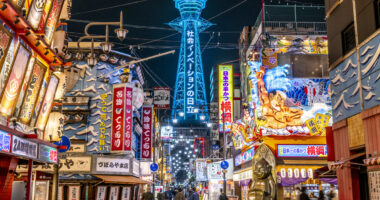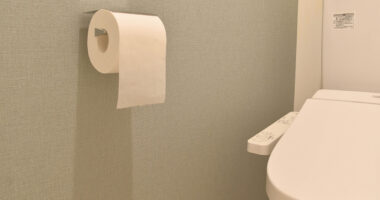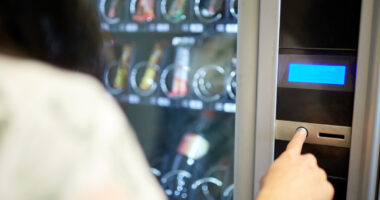In an increasingly digital world, staying connected is crucial for travelers, especially when visiting a foreign country. Naturally, this is also true for Japan. This article will guide first-time visitors through the essentials of mobile connectivity so you can make the best of your time during your stay.
Roaming Plans and Prepaid SIM Cards
When traveling to Japan, you can choose between using your current mobile provider’s roaming plan or purchasing a prepaid SIM card. The former offers data and voice services, whereas the latter offers mostly data, and less commonly, both data and voice services. Roaming plans provide the convenience of keeping your current number and can be activated before your trip. However, they can be quite expensive depending on your provider. It’s essential to research your provider’s specific international roaming options and associated costs before deciding on this route.
Prepaid SIM cards offer a more cost-effective solution and can be purchased at airports, electronic stores, and some convenience stores. Some providers also ship internationally, often with free shipping, so you can head straight for your hotel or other destination in Japan without wasting any time when you arrive.
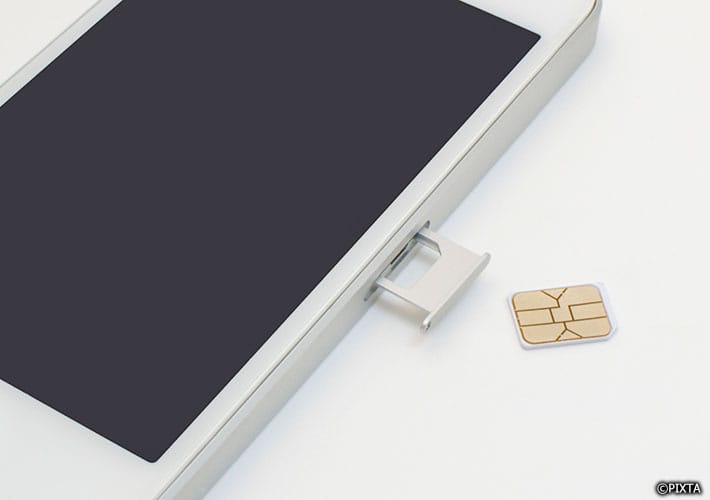
A prepaid SIM card is a cost-effective way of meeting your communication needs when you’re traveling in Japan.
SIM cards come in various data allowances and durations, catering to your specific needs. However, they require a compatible unlocked phone. When selecting the best option, consider the length of your stay, your budget, and your phone’s compatibility with Japanese networks. Consult your mobile provider for roaming options and compare them with prepaid SIM card offers. Some popular prepaid SIM card providers in Japan include B-Mobile, IIJmio, and Y!Mobile. These providers offer various plans, such as unlimited data or tourist-focused packages that come with additional benefits like discounts at popular attractions.
Phone and Mobile Router Rentals
If your phone is not compatible or you prefer not to use it, you can rent a phone or a mobile router (pocket WiFi). Both options provide internet access and can be rented for the duration of your trip. Phone and mobile router rentals are typically available at major airports, some hotels, and select stores. Some providers will also ship them domestically within Japan so you can have them waiting for you at the airport, a hotel, a post office, or any other address. You can reserve a device online before your trip and return it at designated drop-off locations, often at the airport or via mail.
Rental prices vary based on the device and data plan, but you can expect to pay between 500 to 1,500 JPY per day. Rentals are available for daily, weekly, or monthly durations. Popular mobile router rental providers include Global Advanced Communications, Japan Wireless, and Ninja WiFi. Pocket WiFi devices can typically support multiple devices simultaneously, making them an excellent choice for groups or families traveling together.
WiFi Conditions and Hotspot Locations
Japan has widespread WiFi availability in urban areas, and it is becoming more common in rural locations as well. You can find public WiFi hotspots at train stations, airports, convenience stores, cafes, and other public spaces. There are both free and paid hotspots, so be sure to check which one you have access to. Some cities offer free citywide WiFi services, such as Osaka’s “Osaka Free Wi-Fi” and Kyoto’s “Kyoto Wi-Fi.” Service may not extend to all areas, so be sure to check in advance if you’re counting on a connection. Additionally, many accommodations like hotels, hostels, and guesthouses provide free WiFi for their guests.

Planning for a fun-packed day of sightseeing in Japan thanks to the hotel WiFi.
To connect to a public WiFi hotspot, simply search for available networks and follow the on-screen prompts. Keep in mind that some hotspots may require registration or have usage limitations, such as a limited connection time or slower speeds during peak hours. It’s also essential to be cautious about using public WiFi for sensitive transactions or accessing personal information, as security can sometimes be a concern.
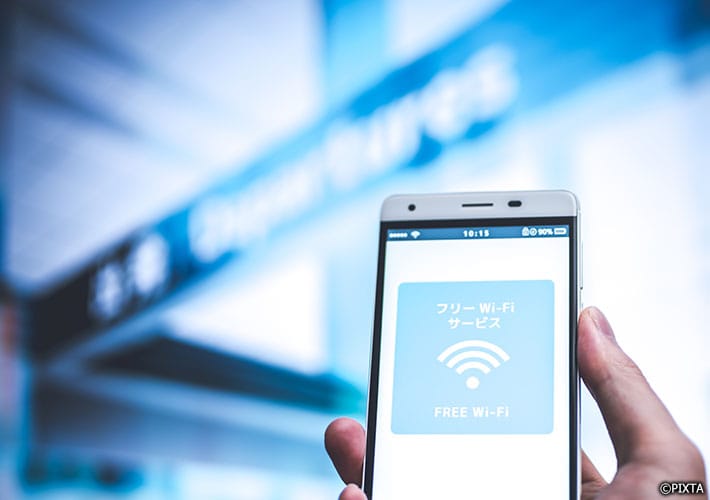
WiFi hotspots are increasingly available throughout Japan.
Public Phones
Public phones, also known as payphones, can be found in train stations, airports, and on some streets. They are becoming less common but can be useful in emergencies, especially when your mobile devices run out of battery. To use a public phone, lift the receiver, insert coins (10 JPY or 100 JPY), and then dial the number. You can also buy prepaid telephone cards at convenience stores. Additional coins may be required for longer calls. International calls can be made from green and gray phones, which are often accompanied by instructions in English.
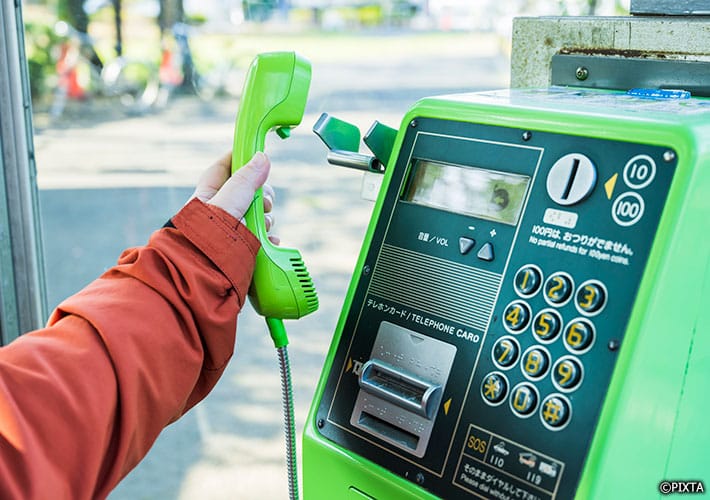
Although they are becoming less common, you can still find payphones in Japan.
Staying Charged in Japan
As for making sure your phone doesn’t run out of batteries, phone and router rental services will often provide a charger for an additional fee. Provided you also have an adapter to plug it into a socket, you can also charge your phone at airports, hotels, and at many but not all cafe and fast food chains. Some even have Qi wireless charging stations for your convenience if your phone is compatible. You’ll also find charging stations where you lock your phone and leave it in places like consumer electronics retailers and mobile shops. Unmanned mobile charger rental stations are often located in convenience stores, stations and shopping malls. Finally, you can enter a manga kissa to relax and use a computer with a fast interet connection while you replenish your batteries with a cable you can borrow from the reception desk free of charge.

If you intend to take many pictures during your travels in Japan, you’ll want to stay charged.
Internet cafes, also known as 漫画喫茶 manga kissa, are popular establishments in Japan that offer a comfortable space to access the internet, read manga, and even take short naps. These establishments typically provide private booths equipped with computers, high-speed internet, and a vast selection of manga. Manga kissa can be found in most urban areas and offer services at reasonable hourly rates. They are an excellent alternative to staying connected or unwinding after a day of exploration, making them a valuable resource for travelers in Japan.
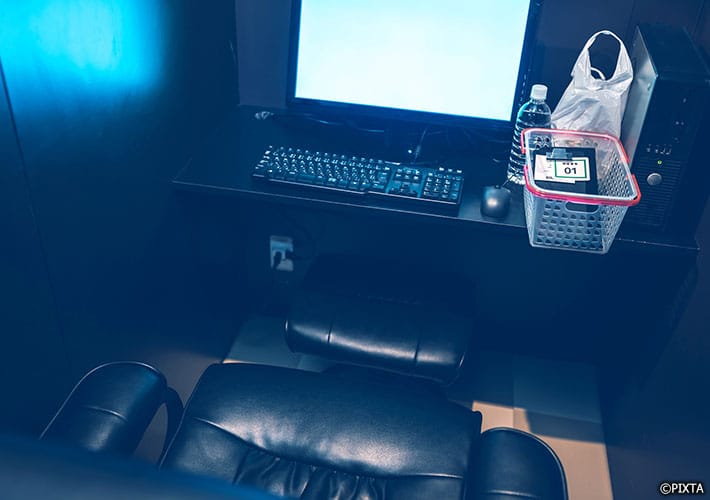
You can charge your phone at a manga kissa.
One important thing to keep in mind during your travels in Japan is that using an electrical socket anywhere other than on a property you own without the owner’s permission is considered a crime (electricity theft). Especially when you’re at an individually-operated restaurant or cafe, be sure that the socket you’re plugging into is intended for public use. If you’re not sure, ask!
Phone Manners in Japan
Phone etiquette is essential in Japan, where consideration for others is highly valued. Be mindful of your surroundings when using your phone in public spaces. Generally speaking, when you’re in a crowded area, it’s best to avoid loud phone conversations as well as using the speakerphone. It is considered impolite to talk on your phone on public transportation, so refrain from making or taking calls on trains and buses.
In Japan, people can get sensitive about having their photos or videos taken. Respect privacy and avoid taking photos or recording videos in such a way that might make people uncomfortable or where it is prohibited, such as in temples, museums, and private establishments. Be especially mindful of photography etiquette in culturally sensitive locations and during special events. When attending traditional performances or ceremonies, it’s essential to follow the rules and guidelines provided by the venue or organizers.
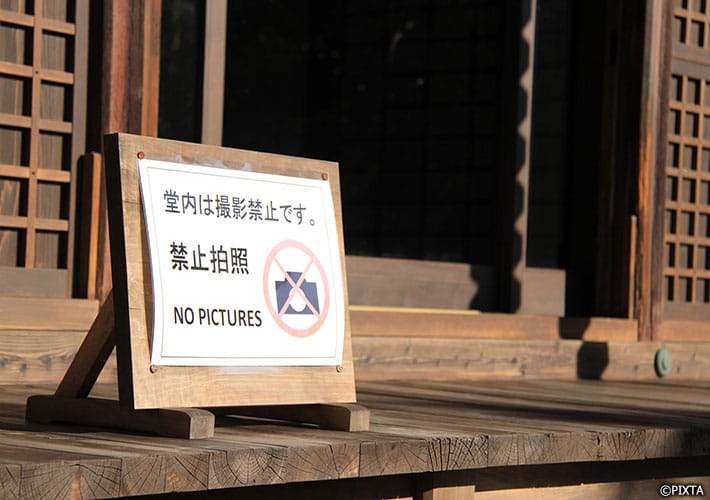
Photography isn’t always welcome in culturally sensitive locations.
In addition to general phone manners, it’s also crucial to understand and respect Japan’s unique customs regarding electronic devices. For example, many onsens (hot springs) and public baths prohibit the use of electronic devices, including smartphones and cameras, to protect the privacy of other guests. Always follow posted signs and rules regarding the use of electronics in these establishments.
Tips for Staying Connected and Saving on Data Usage in Japan
To make the most of your mobile connectivity and save on data usage while in Japan, consider the following tips:
- Utilize free WiFi hotspots whenever possible, but be cautious about security when accessing personal information or making online transactions.
- Adjust your smartphone settings to minimize data usage, such as disabling automatic app updates or reducing video quality when streaming.
- Use messaging apps like WhatsApp, Line, or Facebook Messenger for communication instead of traditional SMS or phone calls.
- Plan your online activities around times when you have access to WiFi, like at your accommodation or a cafe, to conserve data for when you need it most.
- And of course, use Umami bites both before and during your trip!
By following these tips, you can stay connected while traveling in Japan without breaking the bank.
In conclusion, Japan offers several mobile connectivity options to suit your needs, from roaming plans and prepaid SIM cards to phone and mobile router rentals. Be sure to explore public WiFi hotspots, and remember to respect local phone etiquette while enjoying your journey. With a solid understanding of mobile connectivity in Japan, you’ll be better equipped to explore the beautiful country with ease. So, embrace the unique culture, take in the stunning landscapes, and create unforgettable memories in Japan.

